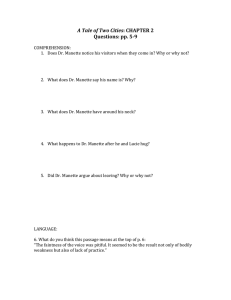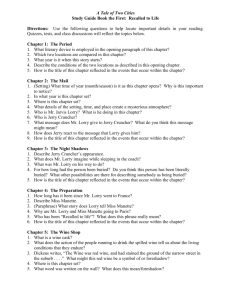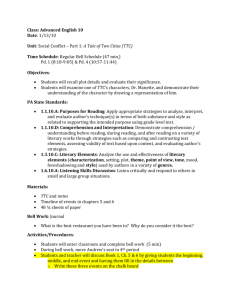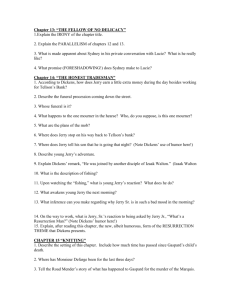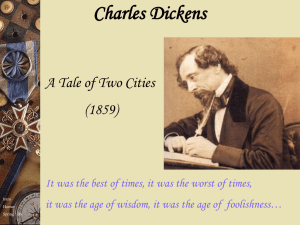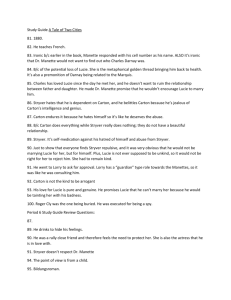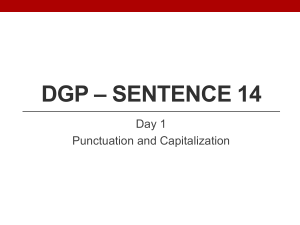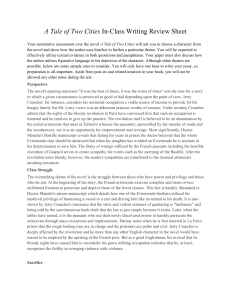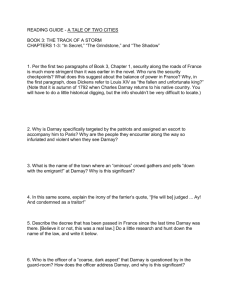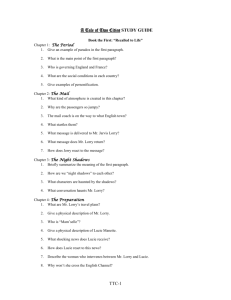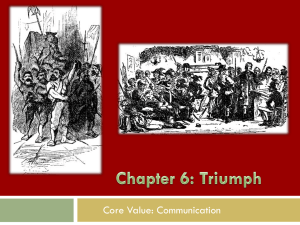AToTC_notes_C - Marblehead High School
advertisement
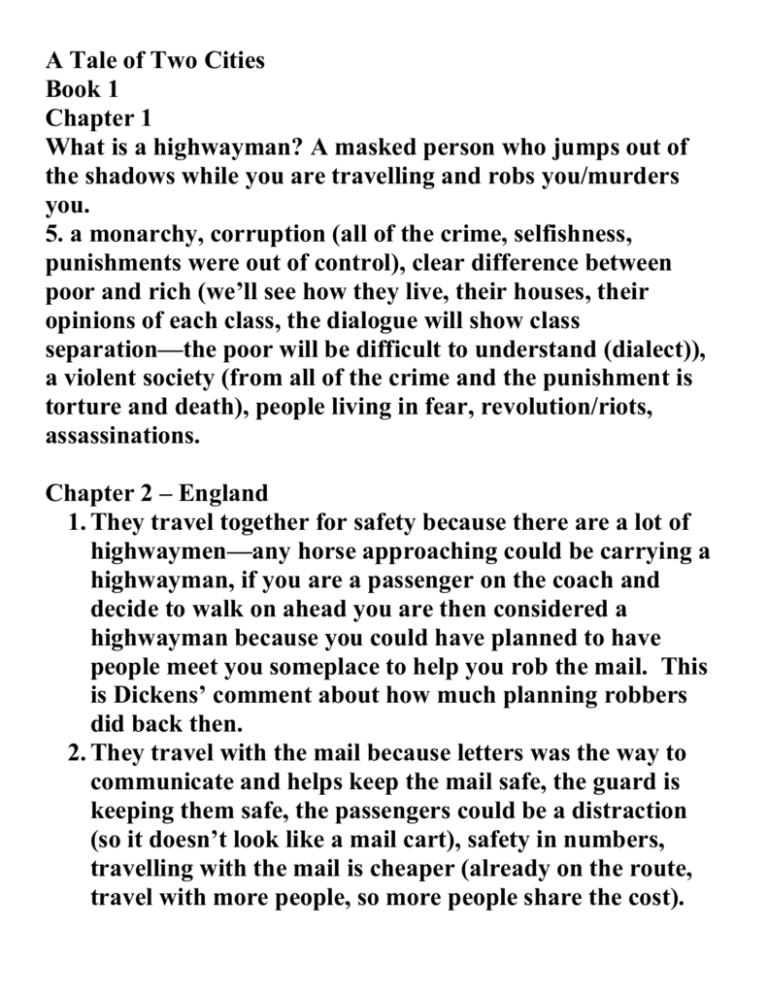
A Tale of Two Cities Book 1 Chapter 1 What is a highwayman? A masked person who jumps out of the shadows while you are travelling and robs you/murders you. 5. a monarchy, corruption (all of the crime, selfishness, punishments were out of control), clear difference between poor and rich (we’ll see how they live, their houses, their opinions of each class, the dialogue will show class separation—the poor will be difficult to understand (dialect)), a violent society (from all of the crime and the punishment is torture and death), people living in fear, revolution/riots, assassinations. Chapter 2 – England 1. They travel together for safety because there are a lot of highwaymen—any horse approaching could be carrying a highwayman, if you are a passenger on the coach and decide to walk on ahead you are then considered a highwayman because you could have planned to have people meet you someplace to help you rob the mail. This is Dickens’ comment about how much planning robbers did back then. 2. They travel with the mail because letters was the way to communicate and helps keep the mail safe, the guard is keeping them safe, the passengers could be a distraction (so it doesn’t look like a mail cart), safety in numbers, travelling with the mail is cheaper (already on the route, travel with more people, so more people share the cost). 3. Jerry has a message to give to Mr. Jarvis Lorry who works with Tellson’s bank. 4. The message tells Mr. Lorry to “Wait at Dover for Mam’selle” (this is French, Mademoiselle—a young lady). 5. Mr. Lorry tells Jerry to bring this response back to the writer of the message, “Recalled to life.” 6. Jerry thinks this is a strange answer (he has to bring that answer, “Recalled to life,” back to the person who gave him the message). It is a strange answer to being told to wait somewhere for someone. 7. Recalled to life! –this must have meaning—you will be asked later 8. They pretend they’re sleeping after they have hidden their jewelry/watches in their boots. To protect their stuff and themselves from highwaymen, and they are suspicious of Mr. Lorry, they don’t trust Mr. Lorry, they think the message and Mr. Lorry’s response could be a trap, it’s all code for a robbery. 9. Maybe Jerry needs to express his ideas to someone so he doesn’t go crazy; he trusts his horse—who else could he talk to about weird things? Chapter 3 – England 1. Everyone has secrets and everyone is a mystery to one another and death turns secrets into mysteries—we’ll never know the secret (that thing we’ll always want to know). What is it about having secrets from other people—why is this a big deal? Makes others suspicious, that person knows something others don’t (we want to know everything), the secrets could be dangerous!, the secret could be helpful. We expect in the rest of the story: there will be secrets, mysteries (things we need to figure out from little pieces of truth) 2. Jerry up close 3. The message goes to the night watchman and then “greater authorities” in Tellson’s Bank. 4. The conversations talk about someone being buried for 18 years and if this person wants to live and if the person wants to see this girl… How can some come back from being buried? 5. “buried alive for 18 years” – how can this be? Maybe the person was in a coma; maybe buried with their stuff (under all of their stuff); someone snuck food to someone who was supposed to die by being buried; a fake death and coming back to the society from which he disappeared (died); figuratively buried—in prison or kept underground (hiding from authorities) Chapter 4 Mr. Lorry – he works in the bank, a manager of sorts, wears worn (old) brown suit but it’s well kept, his shoes are plain but well kept, his wig shines, his eyes are clear and shine, his face doesn’t look anxious or stressed out in any way; What do you think of Mr. Lorry? He’s part of the middle class (bourgeoisie), he works for his money and he has money, doesn’t flaunt that he has money (wears old suit, plain shoes—both, however, look well kept, neat and clean). HW – Thursday – Chapter 4 with the questions. 1. Introducing Dr. Manette, Miss Lucie Manette, Mr. Jarvis Lorry, Miss Manette’s caretaker (Miss Pross) 2. Miss Manette thinks her father is dead. 3. Dr. and Mrs. Manette: their daughter has been in the care of a caretaker since she was a baby, and money was left to take care of this in a trust at Tellson’s Bank (Mr. Lorry works for Tellson’s Bank). Mr. Lorry met the Manette’s in France; Mrs. Manette is originally from England, Dr. Manette is from France. Mr. Lorry was their “financial advisor” working in Tellson’s Bank. Dr. Manette was a bourgeoisie (middle class) and will have money that needs to be managed (hence, Mr. Lorry from Tellson’s Bank). Dr. and Mrs. Manette had a child, Lucie. Dr. Manette was imprisoned (we don’t know why…yet). Mrs. Manette died after 2 years from a “broken heart”. Dr. Manette has been in prison for all of Lucie’s life (she’s 17). It was not made public that Dr. Manette was in prison; everyone was told that he was dead. In reality, Dr. Manette is alive and out of prison—so let’s reunite father and daughter. 4. The worst news is that he has been in prison for all this time. The best news is he is alive and he’s out of prison. 5. There is all of this secrecy because: the family is bourgeoisie and having been in prison would ruin their reputation, his reputation as a doctor would be ruined, it would have been humiliating, it also would have made them outcasts, shunned, and they would have lost their money, their home…If you went to prison at this time, you thought to be trouble and the rest of your family was thought to be trouble, and no one would want anything to do with you (“a jailer always at your heels”—Les Miserables). The police will always be looking at you, your neighbors will never trust you unless you become someone else. Protecting Miss. Lucie Manette. 6. She became still and silent, she “didn’t notice a word”— she was shocked. 7. Miss. Manette’s caretaker is bossy, pushy, angry, interesting. 8. To France to meet Lucie’s father—Dr. Manette. HW – due Tomorrow questions 1-4, pages 32-37 Chapter 5 1. A large cask of wine falls off a wagon and breaks open into the street. a. The poor people drink up all the wine from the street. They all work together to get as much as there is— they don’t fight each other. We know they’re poor because they’re already along the street, they were drinking wine from the street, “cadaverous” faces (dead-looking, gaunt/ thin, pale, starved), “starved fingers and toes.” The wine, red wine, stained like blood—their hands, their feet, the street, their faces, and one person (a “joker”) wrote upon a wall with his finger (dipped in the wine-stained mud) the word— BLOOD. b. We see the word blood, the red wine has stained everyone including the street; Dickens then tells us that there will be death in the streets—that later the street will be stained with actual blood. (hinting at the French Revolution) 2. Monsieur and Madame Defarge they own and operate a wine shop; this puts them in the middle class (bourgeoisie) 3. Description of the setting: Saint Antoine 4. Madame Defarge a. She’s stout and has a steady face (strong features, a poker-face—doesn’t give her feelings away through facial expression.) b. She’s a thinker (to herself); she noticed everything but doesn’t make it obvious that she notices c. Fur, a shawl around her head, large earrings, and lots of rings on her fingers d. She is smart but stuck up; she is wealthy and only thinks about herself (she sells wine—popular product), she’s lazy (she just sits there knitting or picking her teeth), she knows how to get what she wants, antisocial, keeps things to herself, she is trying to embrace every part of being in the upper class (her fancy clothes, not associating with the poor—not watching the commotion of them drinking the wine from the street). HW – due Monday Chapter 5 questions 5-9
